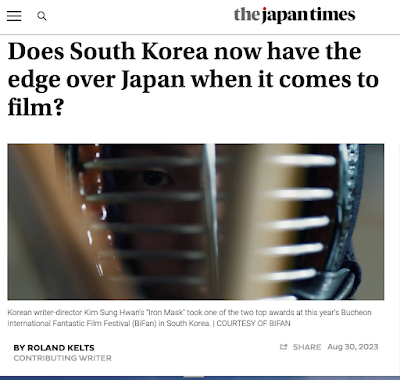Korea's competitive edge: On the 2023 Bucheon International Fantastic Film Festival (BiFan) for The Japan Times
Does South Korea now have the edge over Japan when it comes to film?
That sentence gave me pause during the film’s premiere this summer at the Bucheon International Fantastic Film Festival (BiFan) in South Korea, where “Iron Mask” took one of two top awards. A vision of life as constant competition propels the most riveting of South Korea’s global cinematic sensations, from the Oscar-winning “Parasite” to hit Netflix series “Squid Game” and “D.P.” Characters on the verge of failure are tempted by Machiavellian schemes to survive in a society that respects only winners, and demands of its members brute desperation, fortitude and guile.
By comparison, many of the contemporary Japanese films and series I’ve recently seen — including those featured at this year’s BiFan, where Japanese genre works were spotlighted — feel listless and adrift, self-conscious portraits of Japan filtered through a soft-focus, navel-gazing nostalgia.
This is not always unpleasant. “Midnight Diner” has its charms, “Drive My Car” its moments of quiet beauty. And last year’s exquisitely patient “Zen Diary” plays like a tone poem. But the contrast between today’s South Korean and Japanese stories is stark: The former feel urgent, the latter calmly self-indulgent.
Launched 27 years ago, BiFan is Asia’s largest genre film festival, highlighting works that take their cue from the pioneering 20th-century French director Georges Méliès (“A Trip to the Moon”), who argued that films should convey fantasy rather than reality to make our dreams believable.
Japanese screenings at BiFan included “Life of Mariko in Kabukicho,” co-directed by Eiji Uchida and Shinzo Katayama. Set in Tokyo’s red light district, the film features a host of cliched scenes and characters that reinforce overused stereotypes: a flirtatious male host, a homey, soft-lit bar with chummy regulars, a seedy serial killer, an eccentric who thinks he’s a ninja, clueless foreign cops (the FBI in Japan?) and, yes, extraterrestrials.
As you might guess, the story sprawls and spins off too many threads to cohere. More damningly, it can’t seem to commit to being either a lighthearted ensemble farce or a feminist detective thriller, and it doesn’t have the confidence to alternate genres for meaningful effect.
BiFan’s closing film, “Sana,” suffers a similar lack of conviction. The latest from “Ju-on: The Grudge” franchise director Takashi Shimizu, “Sana” ended the festival with a whimper, wasting its potentially terrifying premise on a real-life J-pop boy band cast (Generations) with questionable acting skills. The ostensible target of throwaway “OK, Boomer” jokes, a 50-something private investigator (Makita Sports) who is also the film’s most compelling character, and the script’s obsession with 1980s tech in the form of a reverse-played audio cassette tape reveal its real concern: nostalgia for a more exciting era in Japan when the stakes were higher, pop music more magical and media formats reliably physical.
And then there’s “Single8,” Kazuya Konaka’s affectionately retro account of Japanese high schoolers in the late 1970s who form an unlikely crew to produce a “Star Wars”-inspired 8-mm short film about an alien encounter. The world they inhabit is strictly analog, and the real hero of their story is an icon of Japan’s electronics-manufacturing heyday: Fujifilm’s long-discontinued Single-8 film format. The title of the students’ short film? “Time Reverse.”
Now take South Korean director Kim Su-in’s taut and relentlessly dark “Toxic Parents,” whose teen protagonist is glued to her smartphone, exchanging text messages with her naively earnest male homeroom teacher while an idol-wannabe frenemy tests her vulnerabilities and her monstrous mom drives her to suicide. Woah.
While Japan’s “Sana” and “Single-8” look back on school-age shenanigans as the source of their loosely-strung narratives, South Korea’s “Toxic Parents” penetrates a high school in the here and now that is hardcore: a locus for outrageous expectations, bullying and necessarily repressed trauma.
Over 11 days, BiFan 2023 hardly lacked in Japanese VIPs. Directors Uchida, Katayama, Konaka and Shimizu appeared alongside manga god Osamu Tezuka’s filmmaker son, Makoto Tezuka (“Tezuka’s Barbara”), Hollywood horror darling Ari Aster (“Midsommar”), veteran South Korean star Choi Min-sik (“Oldboy”), and the producers and lead actor from “D.P.,” which received this year’s Series Film Award. A festival record of 262 films from 51 countries were screened before 67,274 attendees, up 18.2% since 2022.
Time reverse, indeed.

.jpg)




.jpg)